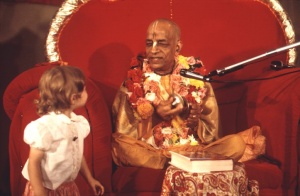SB 4.20.2

A.C. Bhaktivedanta Swami Prabhupada
TEXT 2
- śrī-bhagavān uvāca
- eṣa te 'kārṣīd bhaṅgaṁ
- haya-medha-śatasya ha
- kṣamāpayata ātmānam
- amuṣya kṣantum arhasi
SYNONYMS
śrī-bhagavān uvāca — the Supreme Personality of Godhead, Lord Viṣṇu, spoke; eṣaḥ — this Lord Indra; te — your; akārṣīt — performed; bhaṅgam — disturbance; haya — horse; medha — sacrifice; śatasya — of the one-hundredth; ha — indeed; kṣamāpayataḥ — who is asking pardon; ātmānam — unto yourself; amuṣya — him; kṣantum — to forgive; arhasi — you ought.
TRANSLATION
Lord Viṣṇu, the Supreme Personality of Godhead, said: My dear King Pṛthu, Indra, the King of heaven, has disturbed your execution of one hundred sacrifices. Now he has come with Me to be forgiven by you. Therefore excuse him.
PURPORT
In this verse the word ātmānam is very significant. It is a custom among yogīs and jñānīs to address one another (or even an ordinary man) as one's self, for a transcendentalist never accepts a living being to be the body. Since the individual self is part and parcel of the Supreme Personality of Godhead, the self and the Superself are qualitatively nondifferent. As the next verse will explain, the body is only a superficial covering, and consequently an advanced transcendentalist will not make a distinction between one self and another.